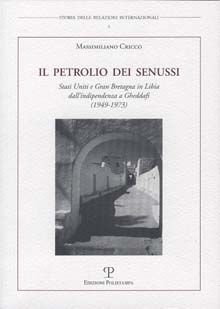
Questo libro ricostruisce la storia interna e internazionale della Libia dall’indipendenza, raggiunta dal Paese arabo nel 1951 grazie all’aiuto finanziario e amministrativo di Stati Uniti e Gran Bretagna, ai primi anni del regime di Gheddafi, dal 1969 al 1973, durante i quali le potenze occidentali si posero numerosi interrogativi sulla possibilità di una coesistenza dei loro interessi militari ed economici in Libia con quelli del nuovo governo insediatosi a Tripoli.
La consultazione, da parte dell’autore, di documenti inediti negli archivi britannici, statunitensi e italiani, ha gettato nuova luce su un periodo in cui la Libia ha svolto un ruolo importante nello scacchiere mediterraneo: prima come postazione strategica anglo-americana, poi, dopo la scoperta nel 1959 di ricchi giacimenti di greggio, come potenza petrolifera di respiro mondiale. Tale periodo, che si credeva rigidamente dominato dal binomio re Idris - potenze occidentali, era invece attraversato da numerose contraddizioni che avrebbero condotto, nell’arco di un decennio (gli anni Sessanta), alla rivoluzione degli “ufficiali liberi” del 1969, di cui nel testo vengono esaminati anche gli aspetti meno noti.
Il volume si avvale di una prefazione redatta dal Prof. Ennio Di Nolfo, uno dei principali studiosi delle Relazioni internazionali del secondo dopoguerra.
Formato PDF
This book draws an image of the internal and international history of Libya from the independence (obtained in 1951, thanks to the administrative and financial support of the US and Great Britain) to the first years of Qadhafi’s regime. In this period (1969-1973) the Western powers wondered if it was still possible for their military and economic interests in Libya to coexist with the goals of the new Government of Tripoli.
By consulting the recently declassified documents at the Public Record Office in London and at the National Archives in Washington D.C., the author has discovered new elements about a period in which Libya played an important role in the Mediterranean: it was a British-American Strategic bastion in the late Forties and during the Fifties. After the first important Oil strike at Bir Zelten, in 1959, Libya started to become one of the most important Oil producers in the World.
The Monarchic Era in Libya, believed to be dominated by the firm alliance between king Idris and the Western powers, was indeed a very contradictory period, in which the popular discontent about the ruling class brought, in a decade (the Sixties), to the “Free Officers” revolution of September 1969. In the book the revolution is examined in detail through the British and American documents, showing the Western powers inquiries on the aims and the intentions of Qadhafi and his fellows.
The acknowledgements to this book have been written by Ennio Di Nolfo, one of the most important Italian scholars in the field of history of International Relations.
PDF format
Polistampa, 2002
Pagine: 256
Caratteristiche: br.
Formato: 17x24
ISBN: 978-88-8304-480-9
Collana:
Storia delle relazioni internazionali, 3
Settori: